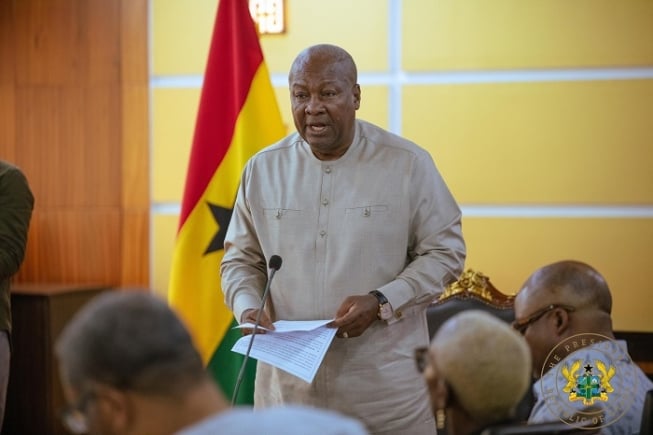President John Dramani Mahama has launched the Accelerated Export Development Advisory Committee (AEDAC), unveiling a comprehensive plan to tackle long-standing obstacles in Ghana’s export sector.
The initiative targets critical issues such as high transportation costs, inefficient port systems, and regulatory red tape that continue to hamper the country’s export competitiveness.
At a ceremony in Accra on Monday, President Mahama highlighted the committee’s mandate: to provide strategic advice and guide national efforts aimed at boosting non-traditional export earnings and strengthening Ghana’s foothold in global markets.
“Our exporters face some of the highest logistics costs in West Africa, and our export clearance times exceed the regional averages,” Mr Mahama said.
To address these inefficiencies, he outlined several infrastructure and policy reforms, including port modernization, the revitalization of the Volta Lake Transport Company, the development of Mpakadan Port, and the activation of the Buankra Inland Port. He also pledged to improve cold chain facilities to support the export of perishable goods such as fish and fresh produce.
“We will modernise our ports, revamp the Volta Lake Transport Company, develop the Mpakadan Port, operationalise the Buankra Inland Port, and expand cold chain infrastructure to support fisheries and horticultural exports.”
President Mahama stressed the importance of streamlining the export process, noting that excessive bureaucracy and fragmented oversight have led to delays and increased costs for businesses. He promised reforms in border management and the introduction of expedited inspection systems.
He referenced data from the International Trade Centre, which estimates that Ghana loses up to $4.3 billion annually in potential export revenue due to regulatory inefficiencies and procedural bottlenecks.
According to him, exporters often struggle with redundant agency mandates, burdensome technical regulations, and limited access to qualified local laboratories for product testing — all of which discourage international buyers and erode confidence in Ghanaian goods.
“Our aim is to grow Ghana’s non-traditional export earnings from $3.5 billion annually to at least $10 billion by 2030,” Mr Mahama said.
He underscored that the new strategy will focus heavily on value addition, promoting finished goods over raw exports, and boosting industrial productivity in sectors such as fisheries, cashew, apparel, pharmaceuticals, and machinery. Strengthening Ghana’s energy mix, he said, would also be vital to supporting industrial capacity.
Another key pillar of the initiative is supporting women entrepreneurs. President Mahama lamented that women account for less than four percent of Ghana’s export volume despite dominating the small and medium enterprise space. He said targeted policies will be introduced to help bridge that gap.
“The work of this committee is to help build a Ghana that earns more than it borrows, a Ghana that processes more than it exports raw, and a Ghana that creates jobs through competitive exports,” Mr Mahama stated.
The committee will collaborate closely with the Ghana Export Promotion Authority, the Ministry of Trade and Industry, and other stakeholders to implement the National Export Development Strategy, which seeks to reposition Ghana as a high-performing, export-led economy.


